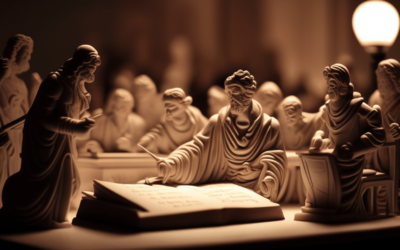- The Ecclesiastic Canons of the Same Holy Apostles approved by Council in Trullo in 692 (This canon list rejected by Pope Constantine) Not all “Church Fathers” agreed even after the Council of Hippo in 393 and the Council of Carthage in 419
- OT books include 3 (not 2) Maccabees and Sirach. NT books include 2 Epistles of Clement: “Let the following books be esteemed venerable and holy by you, both of the clergy and laity. Of the Old Covenant: the five books of Moses–Genesis, Exodus, Leviticus, Numbers, and Deuteronomy; one of Joshua the son of Nun, one of the Judges, one of Ruth, four of the Kings, two of the Chronicles, two of Ezra, one of Esther, one of Judith, three of the Maccabees, one of Job, one hundred and fifty psalms; three books of Solomon–Proverbs, Ecclesiastes, and the Song of Songs; sixteen prophets. And besides these, take care that your young persons learn the Wisdom of the very learned Sirach. But our sacred books, that is, those of the New Covenant, are these: the four Gospels of Matthew, Mark, Luke, and John; the fourteen Epistles of Paul; two Epistles of Peter, three of John, one of James, one of Jude; two Epistles of Clement; and the Constitutions dedicated to you the bishops by me Clement, in eight books; which it is not fit to publish before all, because of the mysteries contained in them; and the Acts of us the Apostles.(8) .” (The Ecclesiastic Canons of the Same Holy Apostles, Book 8, Section 47. Par. 85)
- Athanasius (300?-375) lists the books out before the Council of Hippo in 393 and Council of Carthage in 419 and they do not agree with the Roman Catholic Church
- “But(2a) since we have made mention of heretics as dead, but of ourselves as possessing the Divine Scriptures for salvation; and since I fear lest, as Paul wrote to the Corinthians(3), some few of the simple should be beguiled from their simplicity and purity, by the subtility of certain men, and should henceforth read other books–those called apocryphal–led astray by the similarity of their names with the true books; I beseech you to bear patiently, if I also write, by way of remembrance, of matters with which you are acquainted, influenced by the need and advantage of the Church.
3. In proceeding to make mention of these things, I shall adopt, to commend my undertaking, the pattern of Luke the Evangelist, saying on my own account: ‘Forasmuch as some have taken in hand(4),’ to reduce into order for themselves the books termed apocryphal, and to mix them up with the divinely inspired Scripture, concerning which we have been fully persuaded, as they who from the beginning were eyewitnesses and ministers of the Word, delivered to the fathers; it seemed good to me also, having been urged thereto by true brethren, and having learned from the beginning, to set before you the books included in the Canon, and handed down, and accredited as Divine; to the end that anyone who has fallen into error may condemn those who have led him astray; and that he who has continued steadfast in purity may again rejoice, having these things brought to his remembrance.
4. There are, then, of the Old Testament, twenty-two books in number [CARM note: this number is after the manner which the Jews counted the books from Genesis to Malachi and excluded the apocrypha]; for, as I have heard, it is handed down that this is the number of the letters among the Hebrews; their respective order and names being as follows. The first is Genesis, then Exodus, next Leviticus, after that Numbers, and then Deuteronomy. Following these there is Joshua, the son of Nun, then Judges, then Ruth. And again, after these four books of Kings, the first and second being reckoned as one book, and so likewise the third and fourth as one book. And again, the first and second of the Chronicles are reckoned as one book. Again Ezra, the first and second(4a) are similarly one book. After these there is the book of Psalms, then the Proverbs, next Ecclesiastes, and the Song of Songs. Job follows, then the Prophets, the twelve being reckoned as one book. Then Isaiah, one book, then Jeremiah with Baruch, Lamentations, and[5] the epistle, one book; afterward, Ezekiel and Daniel, each one book. Thus far constitutes the Old Testament.
5. Again it is not tedious to speak of the [books] of the New Testament. These are the four Gospels, according to Matthew, Mark, Luke, and John. Afterward, the Acts of the Apostles and Epistles (called Catholic), seven, viz. of James, one; of Peter, two; of John, three; after these, one of Jude. In addition, there are fourteen Epistles of Paul, written in this order. The first, to the Romans; then two to the Corinthians; after these, to the Galatians; next, to the Ephesians; then to the Philippians; then to the Colossians; after these, two to the Thessalonians, and that to the Hebrews; and again, two to Timothy; one to Titus; and lastly, that to Philemon. And besides, the Revelation of John.
6. These are fountains of salvation, that they who thirst may be satisfied with the living words they contain. In these alone is proclaimed the doctrine of godliness. Let no man add to these, neither let him take ought from these. For concerning these the Lord put to shame the Sadducees, and said, ‘Ye do err, not knowing the Scriptures.’ And He reproved the Jews, saying, ‘Search the Scriptures, for these are they that testify of Me(6).’
7. But for greater exactness I add this also, writing of necessity; that there are other books besides these not indeed included in the Canon, but appointed by the Fathers to be read by those who newly join us, and who wish for instruction in the word of godliness. The Wisdom of Solomon, and the Wisdom of Sirach, and Esther, and Judith, and Tobit, and that which is called the Teaching of the Apostles, and the Shepherd. But the former, my brethren, are included in the Canon, the latter being [merely] read; nor is there in any place a mention of apocryphal writings. But they are an invention of heretics, who write them when they choose, bestowing upon them their approbation, and assigning to them a date, that so, using them as ancient writings, they may find occasion to lead astray the simple.- The following is condensed from the above section for pasting and quoting purposes: “There are, then, of the Old Testament, twenty-two books in number [CARM note: this number is after the manner which the Jews counted the books from Genesis to Malachi and excluded the apocrypha]; Genesis, Exodus, Leviticus, Numbers, Deuteronomy, Joshua, Judges, Ruth, Kings, Chronicles, Ezra, Psalms, Proverbs, Ecclesiastes, Song of Songs. Job, the Prophets, Isaiah, Jeremiah, Baruch, Lamentations, Ezekiel Daniel . . . of the New Testament . . . Matthew, Mark, Luke, John, Acts, James, Peter, John (three), Jude, Romans; Corinthians; Galatians; Ephesians; Philippians, Colossians, Thessalonians, Hebrews; Timothy, Titus, Philemon, Revelation. 6 . . . In these alone is proclaimed the doctrine of godliness. Let no man add to these, neither let him take ought from these. 7 . . . I add this also . . . that there are other books besides these not indeed included in the Canon . . . The Wisdom of Solomon, the Wisdom of Sirach, Esther, Judith, Tobit, the Teaching of the Apostles, the Shepherd.” (Athanasius, 300?-375, Festal Letter 39:5-6, listed before the Council of Hippo in 393 and Council of Carthage in 419).
- “But(2a) since we have made mention of heretics as dead, but of ourselves as possessing the Divine Scriptures for salvation; and since I fear lest, as Paul wrote to the Corinthians(3), some few of the simple should be beguiled from their simplicity and purity, by the subtility of certain men, and should henceforth read other books–those called apocryphal–led astray by the similarity of their names with the true books; I beseech you to bear patiently, if I also write, by way of remembrance, of matters with which you are acquainted, influenced by the need and advantage of the Church.
- Cyril of Jerusalem (315-386)
- “For the process was no word-craft, nor contrivance of human devices: but the translation of the Divine Scriptures, spoken by the Holy Ghost, was of the Holy Ghost accomplished. Of these read the two and twenty books, but have nothing to do with the apocryphal writings. Study earnestly these only which we read openly in the Church. Far wiser and more pious than thyself were the Apostles, and the bishops of old time, the presidents of the Church who handed down these books. Being, therefore, a child of the Church, trench thou not upon its statutes. And of the Old Testament, as we have said, study the two and twenty books, which, if thou art desirous of learning, strive to remember by name, as I recite them. For of the Law the books of Moses are the first five, Genesis, Exodus, Leviticus, Numbers, Deuteronomy. And next, Joshua the son of Nave, and the book of Judges, including Ruth, counted as seventh. And of the other historical books, the first and second books of the Kings are among the Hebrews one book; also the third and fourth one book. And in like manner, the first and second of Chronicles are with them one book; and the first and second of Esdras are counted one. Esther is the twelfth book; and these are the Historical writings. But those which are written in verses are five, Job, and the book of Psalms, and Proverbs, and Ecclesiastes, and the Song of Songs, which is the seventeenth book. And after these come the five Prophetic books: of the Twelve Prophets one book, of Isaiah one, of Jeremiah one, including Baruch and Lamentations and the Epistle; then Ezekiel, and the Book of Daniel, the twenty-second of the Old Testament.”–Cyril of Jerusalem (Catechetical Lectures, 4:34-35)
- The following is condensed from the above section for pasting and quoting purposes:
- ” . . . have nothing to do with the apocryphal writings . . . And of the Old Testament, as we have said, study the two and twenty books, Genesis, Exodus, Leviticus, Numbers, Deuteronomy, Joshua, Judges, Ruth, Kings, Chronicles, Esdras, Esther, Job, Psalms, Proverbs, Ecclesiastes, Song of Songs, Isaiah, Jeremiah, Baruch, Lamentations and the Epistle; Ezekiel, Daniel.”–(Cyril of Jerusalem, 615-386, Catechetical Lectures, 4:34-35).
- “For the process was no word-craft, nor contrivance of human devices: but the translation of the Divine Scriptures, spoken by the Holy Ghost, was of the Holy Ghost accomplished. Of these read the two and twenty books, but have nothing to do with the apocryphal writings. Study earnestly these only which we read openly in the Church. Far wiser and more pious than thyself were the Apostles, and the bishops of old time, the presidents of the Church who handed down these books. Being, therefore, a child of the Church, trench thou not upon its statutes. And of the Old Testament, as we have said, study the two and twenty books, which, if thou art desirous of learning, strive to remember by name, as I recite them. For of the Law the books of Moses are the first five, Genesis, Exodus, Leviticus, Numbers, Deuteronomy. And next, Joshua the son of Nave, and the book of Judges, including Ruth, counted as seventh. And of the other historical books, the first and second books of the Kings are among the Hebrews one book; also the third and fourth one book. And in like manner, the first and second of Chronicles are with them one book; and the first and second of Esdras are counted one. Esther is the twelfth book; and these are the Historical writings. But those which are written in verses are five, Job, and the book of Psalms, and Proverbs, and Ecclesiastes, and the Song of Songs, which is the seventeenth book. And after these come the five Prophetic books: of the Twelve Prophets one book, of Isaiah one, of Jeremiah one, including Baruch and Lamentations and the Epistle; then Ezekiel, and the Book of Daniel, the twenty-second of the Old Testament.”–Cyril of Jerusalem (Catechetical Lectures, 4:34-35)
- Eusebius (263-339) 2nd Peter does not belong to the canon.
- “But we have learned that his [Peter’s] extant second Epistle does not belong to the canon . . . Such are the writings that bear the name of Peter, only one of which I know to be genuine” (Church History, 3:3:1, 3:3:4)
Examples of bad interpretations of Scripture by various Church Fathers
The Church Fathers did a great job of expounding on Scripture. They clarified, defined, and refuted. We owe a debt to...






